You can read this article from here
Bonus: Spider-Man’s Most Embarrassing Moment
You can read this article from here
Bonus: Spider-Man’s Most Embarrassing Moment
Collected by noupe
Today we have an exciting and enticing post which covers handy and innovative infographics. Infographics is basically derived from two words: ‘information’ and ‘graphics’, and it stands for the graphical representation of data and information.
Data visualization techniques have been often used in modern maps to incorporate variety of information, for instance for network designs, destination points, and local landmarks. Let’s take a look at some creative examples of beautiful infographics.
The Most Dangerous Cities for Walking
Glass Half Empty: The Coming Water Wars
Which Countries Have the Most Vacation?
Where Will the Next Volcano Erupt?
On Driving: Automobile History
Who Has Given the Most to Haiti
An Infographic Guide to Buying Your Own Island
SSSMOKIN! The Global Tobacco Trade
The Most Prescribed Psychiatric Drugs
The Rise of Walking and Biking
Subway Science: 500 Years of Great Scientists
Which Countries Invest the Most in Alternative Energy?
CHOOSE YOUR WEAPON – THE GLOBAL ARMS TRADE
RED TAPE – THE GOVERNMENT GRIND
Visualizing the US and China Trade Relations
Google Maps for Mobile timeline
Stealing the Show – The Global Movie Biz
The Great Pacific Garbage Patch
A Humorous Look at Infographics
Underskin: The Human Subway Map
The 2010 Social Networking Map
Where the Stuff on the Internet Comes From
Why do freeways come to a stop?
A Modern History of Human Communication
What are People Really Buying Online?
The Web 2.0 Points of Control Map
The Most Powerful Colors on the Web
Which Governments Demand Google Remove Information
Bonus:Beautiful picture of STS-133 rolling out to launch pad
Bonus: Nobody wins.

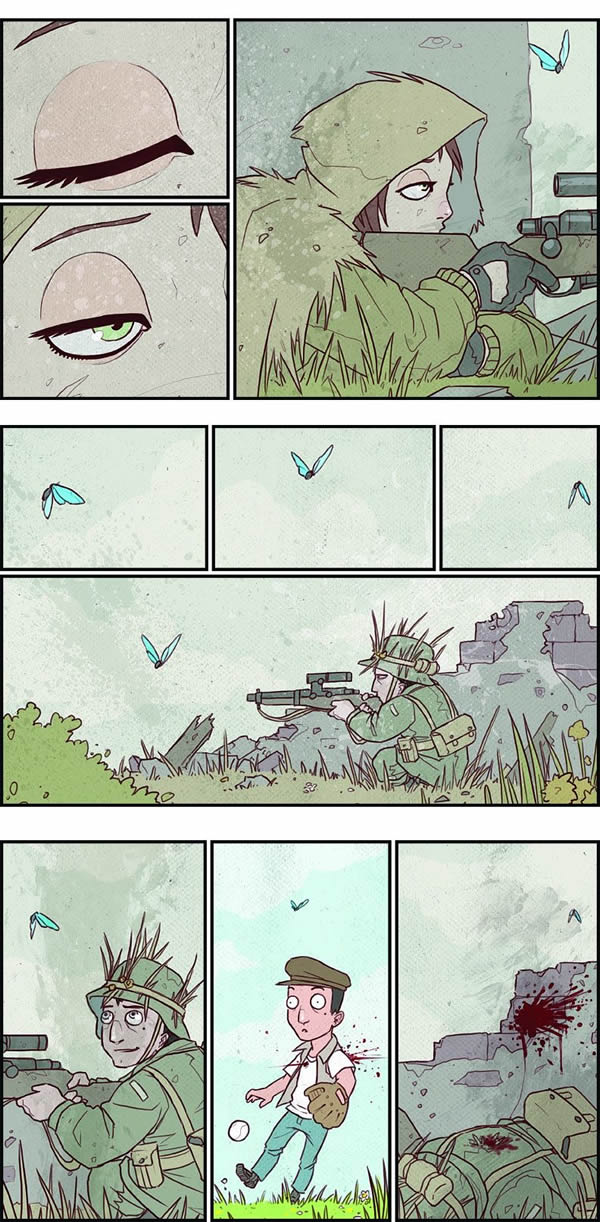
Written by Miranda Marquit
 When you go into a bank, the truth is that you are probably on your own when it comes to your own financial interests. Everyone may be friendly and eager to help when you walk in the door, but the bank is a business, and it exists to make a profit. That means that your bank wants to make money off of you. Helping you with your finances may not be high on your banker’s to-do list. Here are nine things your banker probably won’t tell you:
When you go into a bank, the truth is that you are probably on your own when it comes to your own financial interests. Everyone may be friendly and eager to help when you walk in the door, but the bank is a business, and it exists to make a profit. That means that your bank wants to make money off of you. Helping you with your finances may not be high on your banker’s to-do list. Here are nine things your banker probably won’t tell you:
This information is somewhere in your account materials, but your banker isn’t going to actually tell you this when you make your deposit. Some banks only allow you access to the first $50 or $100 of your deposit. So, if you make a $500 deposit, $400 of it may not be available until the next business day – or later. That means that you can still bounce checks or overdraw your account (and the bank can collect the fee), even though you made your deposit. Ask your banker when the full deposit will become available, since he or she is unlikely to volunteer the information.
If you are giving out a post-dated check, you have to trust the recipient not to cash it ahead of schedule, because the bank is likely to just run it through when it arrives without looking at the date on it. Even if the teller looks at the date, a bank has no legal obligation to honor the date on the post-dated check. The bank will accept the check and it could bounce.
Your banker probably won’t tell you that fees are the biggest money maker for banks. The interest earned on loans – and even on credit cards – pales in comparison to the fees that banks charge. In 2009, it was estimated that banks made more than $38 billion in overdraft fees alone, according to a study by Moebs Services. Add in other fees, such as the smaller fees charged at ATMs, for paper statements, and for not maintaining minimum balances, and that number is even bigger. The fees you pay are more valuable to banks than just about anything else that you do.
Some banks have a policy of waiving one or two fees each year – just because you asked. You can have a single overdraft fee waived at your request, or ask for refunds on ATM fees. While these policies exist, many bankers aren’t forthcoming about them. Banks make more if you just pay the fees, fuming in silence. Ask if there is a policy to waive at least a fee or two at your bank.
Recently, rules regulating “standard overdraft practices” went into effect for checking accounts. Now, before banks can approve transactions that you do not have sufficient funds for, you have to opt in. If you choose not to opt in, your debit card transaction will be denied if you don’t have enough money in your account. However, what the bank may not tell you is that checks you write, and automatic bill payments you have scheduled are not included in the new rules. Banks can still approve checks and bills over the amount you have in your account – and charge you a fee for the overdraft.
You might be interested in checking your online account information to find out where you stand. However, your information may not be up to date. Sometimes, there are inaccuracies in your online account information, or it doesn’t take account for the way that transactions are actually processed. While your online account can be a good guide, it is not always exactly accurate, and if you are cutting things close, you may find yourself in trouble if you rely on your online account information.
Your banker may tell you that he or she is offering a great product or service, but this might not be the best financial decision for you. Indeed, bankers are salespeople, as well as bankers. The more products they can get you to “buy,” the more money the bank makes. Many banks now offer insurance, retirement accounts and more services beyond checking and savings accounts and loans. Be wary when the bank pitches you on a product or service. It might be more about the bank’s bottom line than your bottom line.
Many people just go to their bank for loans and other products. It seems easier and more convenient to keep their financial accounts at one institution. Additionally, many assume that, because they have been loyal customers, they will get a good deal. Unfortunately, this is not always the case. In fact, your bank may not have the best interest rate on a home equity loan, or your bank’s retirement plan may charge higher fees. While you want to include your bank in the search, it’s best to shop around for the best deal. Make sure your banker knows when you find a better deal elsewhere. Your bank should be competing for your business, not just assuming that they should have it.
One of the assumptions that people make is that they are getting a personal decision when they talk with a banker in person. The perception is that the banker can make decisions locally. However, if the bank is branch of a national bank, it is far more likely that the system will make the decision. A banker may talk to you about your options, but ultimately your information is fed into a computer system and reduced to a number. Which means the system is deciding. Unless you are banking at a smaller, community bank, and talking to the owner or manager, chances are an impersonal system will make the ultimate decision about your loan.
Bonus: My Butt is Big
Written by Eliezer_Yudkowsky

Today is September 26th, Petrov Day, celebrated to honor the deed of Stanislav Yevgrafovich Petrov on September 26th, 1983. Wherever you are, whatever you’re doing, take a minute to not destroy the world.
The story begins on September 1st, 1983, when Soviet jet interceptors shot down a Korean Air Lines civilian airliner after the aircraft crossed into Soviet airspace and then, for reasons still unknown, failed to respond to radio hails. 269 passengers and crew died, including US Congressman Lawrence McDonald. Ronald Reagan called it “barbarism”, “inhuman brutality”, “a crime against humanity that must never be forgotten”. Note that this was already a very, very poor time for US/USSR relations. Andropov, the ailing Soviet leader, was half-convinced the US was planning a first strike. The KGB sent a flash message to its operatives warning them to prepare for possible nuclear war.
On September 26th, 1983, Lieutenant Colonel Stanislav Yevgrafovich Petrov was the officer on duty when the warning system reported a US missile launch. Petrov kept calm, suspecting a computer error.
Then the system reported another US missile launch.
And another, and another, and another.
What had actually happened, investigators later determined, was sunlight on high-altitude clouds aligning with the satellite view on a US missile base.
In the command post there were beeping signals, flashing lights, and officers screaming at people to remain calm. According to several accounts I’ve read, there was a large flashing screen from the automated computer system saying simply “START” (presumably in Russian). Afterward, when investigators asked Petrov why he hadn’t written everything down in the logbook, Petrov replied,”Because I had a phone in one hand and the intercom in the other, and I don’t have a third hand.”
The policy of the Soviet Union called for launch on warning. The Soviet Union’s land radar could not detect missiles over the horizon, and waiting for positive identification would limit the response time to minutes. Petrov’s report would be relayed to his military superiors, who would decide whether to start a nuclear war.
Petrov decided that, all else being equal, he would prefer not to destroy the world. He sent messages declaring the launch detection a false alarm, based solely on his personal belief that the US did not seem likely to start an attack using only five missiles.
Petrov was first congratulated, then extensively interrogated, then reprimanded for failing to follow procedure. He resigned in poor health from the military several months later. According to Wikipedia, he is spending his retirement in relative poverty in the town of Fryazino, on a pension of $200/month. In 2004, the Association of World Citizens gave Petrov a trophy and $1000. There is also a movie scheduled for release in 2008, entitled The Red Button and the Man Who Saved the World.
Maybe someday, the names of people who decide not to start nuclear wars will be as well known as the name of Britney Spears. Looking forward to such a time, when humankind has grown a little wiser, let us celebrate, in this moment, Petrov Day.
Bonus: Mothers…

Fathers…

Written by elearners
Why do students have to use a hall pass? Because all schools enforce policies that don’t make much sense. What’s all this hubbub about hand raising, for instance? And, for the love of Mike, why can’t you enjoy a smoke in the privacy of the bathroom?
These problems have plagued kids for years. But today it’s worse than ever. Certain schools are enacting policies that are downright creepy …
Leave it to the wild and crazy Brits to combine Harry Potter uniforms with James Bond technology. In England, a private school in South Yorkshire is tracking their students with microchips.

The skirts are for uniformity, the socks are for circulation
There are a few reasons for making these students wear RFID chips:
Although it seems to make sense as a measure to combat ditching class, it also serves as a horrible invasion of privacy. The idea of bugging children makes students look and feel like inmates, when realistically only, say, 20% of them are headed in that direction.
For those schools who enjoy playing a much more balanced game of cat-and-mouse, video surveillance kits appear to be all the rage.

A peek at the exits, all too far away from this computer to take any action
What better environment to foster learning than that of a supermarket, or perhaps a suburban casino boat? Really, what easier way is there to learn how to read than with the soothing mechanical buzzing of a zoom lens behind a dome of glass? Could there be a more efficient way to be outed as the kid who farted than through reviewing the infrared thermal footage? If you ask us, video cameras belong on movie sets, not in schools.
In an effort to crack down on “sexting” amongst teenagers, several pervy principals have decided they have the right to confiscate and peruse the cell phones of their students.

Peek-a-boo!
By viewing the evidence first hand, these principals are allowed to punish students like the bad boys and girls they are. To us, this is the equivalent of principals of the 1960’s hiding behind the trees at make-out point, or the principals of the 90’s hiding out in the alley behind a teenager’s house. Teenagers are going to get it however they can, and confiscating cell phones should be a job for mortified parents, not overly concerned principals.
One Catholic school in Richmond, VA has declared a strict “hands-off” policy. This sounds like a welcome change from the negative stigma of corporal punishment surrounding Catholic schools. However, this policy has allowed one four-year-old boy to wander off on four separate occasions.

The boy, seen here, awaiting the 77 bus during snack time
While the school claims that it is a “safe handling” issue, parents claim that it’s a “are you f#%*ing stupid” issue. Instead of physically stopping the boy, teachers followed him from a safe distance before alerting the authorities who then came to retrieve the child. Apparently this school believes that instead of endangering a teacher’s career by asking them to touch a child, it’s a much better idea to endanger it by having them follow the child, leave 27 other children alone unattended, and then call the police, wasting their time and taxpayer money. Though, being a Catholic school, they aren’t legally allowed to see any of the taxpayer money, so maybe this is their way of feeling included.
It was bound to happen. You need to educate the masses before the babies start having babies, right?

Finally got him down for his 3:00 nap. Time for my 3:05 nap!
One school in Montana isn’t taking any chances, by beginning sex education classes as early as kindergarten. Maybe this is a good thing. Countries like Italy and Spain, where children drink wine from a young age, don’t have nearly the problems with teen drinking that America does.
Perhaps if we begin sex education at 5, children will be over it by the time they’re 10 and be grizzled and put off by sex like an old married couple by the time they go to prom. It’s worth a shot.
Recently, Arizona Governor Jan Brewer passed a bill banning ethnic studies in schools. This eliminates classes such as Latino Literature, or African American History, which had been taught in Arizona schools for years.

Arizona deporting a boatload of Irishmen to free-loving California, copyright June 2010
Many opponents of this bill of fail to see that eliminating these classes now makes room in the curriculum for more important and practical classes, such as White History, Caucasian Science and Master Race Phys. Ed.
Kudos to Arizona for expanding the horizon for all students… unless they are students of color, in which case they must drink from a separate fountain (located in New Mexico).
Bonus: This is one innovative cat

Written by degreescout

Via bbc.co.uk
Lie Told
The peppered moths of Britain evolved from light to dark because of the pollution caused by the industrial revolution.
Why It Is a Lie
Teachers love this little story because it makes it so easy for students to understand the concept. The image of the light and dark moths on light and dark surfaces is simple to grasp. Too bad the tale is more black and white than the moths.
Peppered moths came in a variety of shades, from light to dark and have existed as such since before the industrial revolution. By oversimplifying the situation, natural selection is painted as a life-or-death situation.
Why It Shouldn’t Change
Middle school students don’t really need to grasp the complexities of natural selection. Further explanation in later grade levels builds on this basic, but not complete concept.

Lie Told
Crazy Vincent Van Gogh cut off his ear and gave it to a girl as a token of his love. Did we mention that he was crazy?
Why It Is a Lie
While the crazy part is a fact, and the gift giving part may be true, Van Gogh did not cut off his own ear. He actually lost it in a fight with friend and fellow artist, Paul Gauguin.
Why It Should Change
People don’t need to think Van Gogh was crazier than he was.
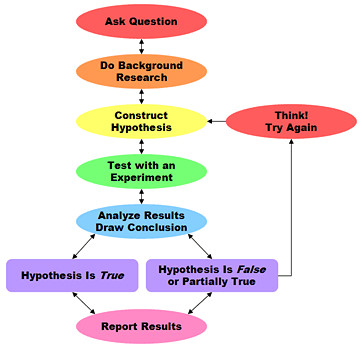
Via Sciencebuddies.org
Lie Told
Scientists follow a rigid procedure called the “scientific method” for every experiment conducted.
Why It Is a Lie
There is no one method or procedure. Science isn’t a wash, rinse, repeat kind of thing. While hypothesis-experiment-conclusion is a method used by scientists, it is one of many.
Why It Should Change
By telling such a lie, children are led to believe that there is no creativity or imagination in science.

Lie Told
Pocahontas was an adult Powhattan princess who saved John Smith’s life and later fell in love with him.
Why It Is a Lie
First and foremost, Pocahontas was twelve at the time that John Smith and his crew landed in the New World. That takes care of the adult and, hopefully, the romance pieces of this tale. Furthermore, there were no witnesses to the part about her saving John Smith’s life. Last but not least, John Smith had a well recorded tendency to exaggerate and embellish stories.
Why It Shouldn’t Change
The Disney remake would be far less magical.

Lie Told
Witches were burned at the stake in Salem, MA.
Why It Is a Lie
While many accused witches were burned at the stake in England, British law did not allow the punishment in their colonies. Instead, witches were hanged if they managed to survive death row.
Why It Shouldn’t Change
The method of death is far less important than the reasons for the deaths. While factually inaccurate, the important information about the events doesn’t have to do with the manner of death.

Via wilsonsalmanac.com
Lie Told
The Founding Fathers were all Christians.
Why It Is a Lie
The Founding Fathers held a wide array of religious beliefs, ranging from Christianity to Deism. Thomas Jefferson rejected the concept of the Trinity and loathed the idea of a national religion. Benjamin Franklin and John Adams were Deists.
Why It Should Change
It is important that the reality of our founding fathers beliefs be understood, but it is most important that the emphasis of the separation of church and state be taught.

Via ushistory.org
Lie Told
Benjamin Franklin discovered electricity by flying a kite in a lightning storm and, subsequently, getting struck by lightning.
Why It Is a Lie
While Benjamin Franklin did propose the idea of a kite experiment, he never actually went through with it. If he had, he would likely have died.
Why It Shouldn’t Change
Children already know being struck by lightning will kill you. They can keep this story.

Lie Told
Little George Washington chopped down his father’s cherry tree. When called out on it, he confessed to being a pint-sized pain in the butt.
Why It Is a Lie
George Washington’s biographer inserted the made-up story, and other tall tales of the late President, into his two books. He did this, presumably, for his own amusement.
Why It Shouldn’t Change
Ironically, it teaches kids that they shouldn’t lie.

Lie Told
The Native Americans and Pilgrims had a potluck dinner/lovefest filled with fat turkeys and corn. Everyone lived happily ever after.
Why It Is a Lie
The entire story is a romanticized version of history. While the Pilgrims and Native Americans did break bread many times, it was never a tradition or annual occurrence.
Why It Should Change
Learning the reality of the relationship between the Pilgrims and the Native Americans would give students a better historical insight into the foundations of America, and the impact of our arrival here on the Native American way of life.

Via telegraph.co.uk
Lie Told
Isaac Newton discovered the law of gravity when an apple fell on his head.
Why It Is a Lie
This story was never mentioned by Newton. It didn’t come into existence until around sixty years after it allegedly happened. The lie was first told by John Conduitt, who was most likely using the apple as a literary device. The part about the apple viciously attacking Newton’s noggin was added later.
Why It Shouldn’t Change
It gives children hope that one day they could have that “lightbulb moment” just like one of mankind’s geniuses.
Bonus: Coolest Dad Ever
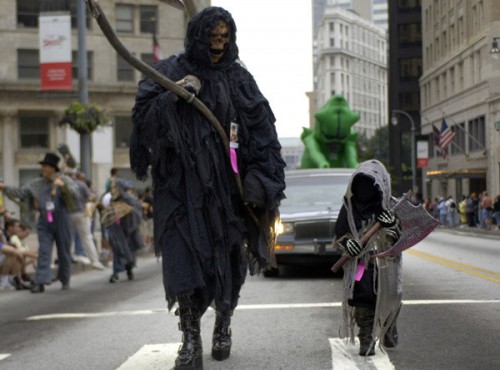
Written by Owen Javellana
Hollywood is a place of long-standing tradition, of history, of precedent and of practice. Here are some practices that suck. Honorable mentions include “Letting Natasha Bedingfield Anywhere Near Your Soundtrack.”

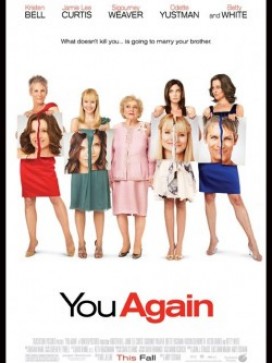
I don’t expect a plot synopsis on a poster. But all marketing logic suggests I should be able to get a vague idea of what the movies about. Yet still, every once in a while you get a poster that tells us next to nothing. The poster for Hitch suggests a plot about Will Smith JUST STANDING THERE. On the opposite side of the spectrum are posters so convoluted that they take 2 minutes of guessing. The poster for You Again requires you to stare at it for two minutes, drawing mental lines to connect each woman to her enemy (I guess?). Looking at posters should not feel like the activities for kids on the back of a cereal box.

Unless this is the cover of a mystery novel sold at Walgreens, the creator’s name should never be as big as the title of the movie. You can advertise the director, sure, but the movie should sell itself, not just rely on the name and reputation of whoever’s directing it. It may get attention, but it comes off as un-classy, like R&B singers who feel the need to sing their own name as soon as the song starts. Not to mention how this can bite you in the ass when disappointed critics wonder who’s to blame for “Tyler Perry’s Madea Jumps The Shark.”

It’s understandable that studio’s want you to buy their movie. It just gets aggrvating when they want you to buy the same movie over and over again. They’ll release a bare-bones, standard DVD early, with next to nothing in the way of extra features (an audio set-up, some cast bios, and pausing). Then they’ll release a “special edition” a few months later, with the features you would actually want to see. And God help you if you’re a fan of a series, you’ll be buying a new “complete” set every time a new installment comes out.
This is pretty self-explanatory. For example, this is a trailer for Charlie St. Cloud, which comes off less like a trailer and more like a recap of the first hour and a half of the movie, for someone who arrived really, really late. I personally haven’t seen Charlie St. Cloud, because it’s about Zac Efron playing baseball with a dead little boy (three things I care little about), but… I don’t really need to see it anymore, do I?

We get it, CGI is advanced now. Gone are the whimsical days of Who Framed Roger Rabbit? and Space Jam, where 2D animation walked side by side with Michael Jordan. Nowadays, computer animation is able to make these once-beloved characters juuuust realistic enough to be absolutely creepy. With the upcoming adaptations of Yogi Bear (2010) and The Smurfs (2011), children who have never seen a single episode of the cartoons can now look forward to seeing them in their nightmares.

In 1999, when The Matrix was being promoted (yes, it was that long ago), the website was whatisthematrix.com. This worked back then because A.) it was one of the first times, and B.) it made sense with the plot, which was centered around discovering what the Matrix was. Nowadays, it’s a just a cheap way to ask people to be curious about your movie. Who is Salt(.com)? Who are the Takers(.com)? Does the Sisterhood travel, or just the Pants(.com)?
Incidentally, after watching Takers, I no longer care in the slightest who they are.
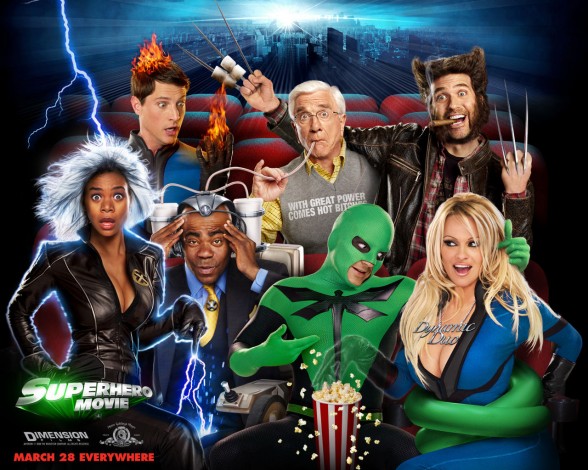
This year, we will have the joy of seeing Not Another Not Another Movie. I’m not joking. A parody about parodies. We have scraped the bottom of the barrel so hard, we have tunneled through to the top of a barrel in China.

Giving roles meant for racial minorities to white actors and actresses is nothing new. Hollywood has done it with animated characters (The Last Airbender), real life figures (21), and now historical figures, with the upcoming Ghengis Khan film starring the decidedly un-Mongolian Mickey Rourke. I won’t get into the politics of it right now, but everytime Hollywood does this I feel like they’ve lined up every minority’s face perfectly, so they could run down the line and slap each one, like a pro-wrestler giving high fives to the crowd.

People are split on 3D. Some people love it. Personally, I forget it’s there after 4 minutes. But one thing people can agree on: If you tack on 3D effects after you’ve wrapped instead of filming in 3D from the beginning, every one hates you. It’s like how junk food adds high-fructose corn syrup. I’m sure it’s cost effective and profitable to put in your product, but there’s still a general understanding by the consumer that it’s the worst thing ever.

Paul Walker has the personality of an Ikea coffee table and the street cred of an Ikea coffee table. Casting him alongside Tyrese or T.I. only highlights this fact. He can’t even pull off saying the line, “My pockets ain’t empty, bro,” in 2 Fast 2 Furious. Even dorky white guys can say “bro.” But once again, Walker defies all convention.
Bonus: Happy first day of Autumn

Written by Shmoop
(see answer key at the bottom)

1. Tah sleep, purchance tah dreem…prolly tah dreem.

2. I herd a fly buzz when I died. I atsed it.

3. Do not go gentul intah that good nite! Das where basement cat lives.

4. Billie Jean? Defanully not mah lubbr.

5. Dey say dis cat is a bad muvah – SHUT YERZ MOUF!!!1!

6. All animals r equal. But sumz equalr than others.
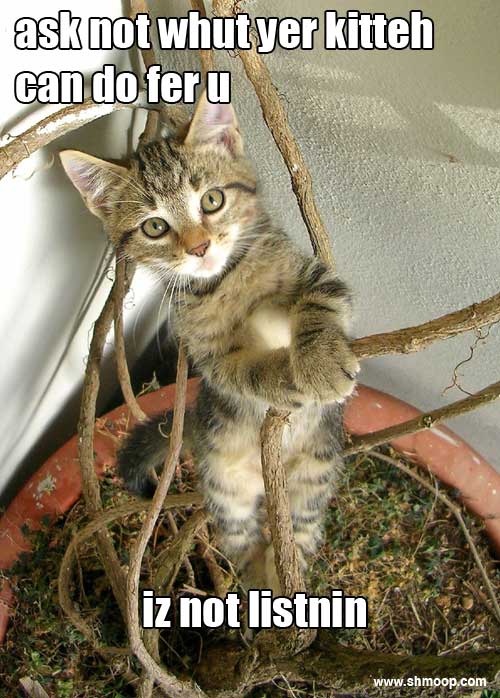
7. Ask not what yer kitteh can do fer you: Iz not listnin.

8. Et tu, Kittéh?

9. Tah b r not tah b – Das wut Iz ponderin.

10. A DREAM!!1! I haz it.

11. Mah namez Ineego Montoyah. U killd mah fathur. Pruhpair fer dyin.

12. Get dee to ah nunnr… nunn…SCOOT!!!!!

13. Das one small step fer man, one giant leap for kitteh.

14. O hai! Grownd contrul? Dis iz Majr Tom.

15. Lub iz a battlefield. Youz losin.

16. It waz bestest timez, it waz wurstest times.

17. No kitteh iz a island. Deyz hatez water.

18. Unkl Kitteh wantz YOU! Tah change dah litter.

19. O hai sir! I can haz moar porrige?
http://lh5.ggpht.com/_MsZb8mYFoCs/TJrzSpLE1zI/AAAAAAAALkU/LB4haDbxzvE/s800/lolcat20-Frost.jpg
20. Iz in yer woods, takin tha road less trabbled by.

21. How do I lub dee? Lemme count da wayz. Un, too, fybe…

22. All dat glittrz iznt gold. But itz still fun tah play wib.
http://lh3.ggpht.com/_MsZb8mYFoCs/TJrzTy0tXvI/AAAAAAAALkg/zZNPRtqo4DE/s800/lolcat23-LasVegas.jpg
23. We wuz somewhere round Barstow onna edge ov da desert…

24. Let mah peepl go!!1! Wez gotsa pee.

25. Frenz, romanz, countrymenz, lend mah yerz eerz! Das right… jussa liddle closer…

26. Quof da raben: Noperz!
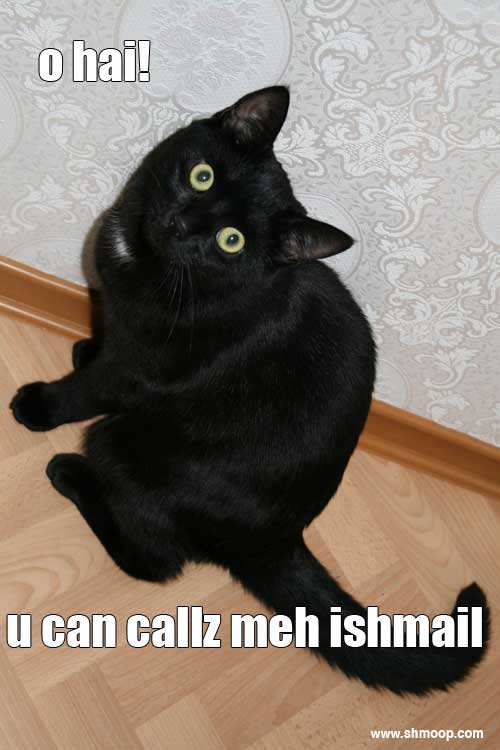
27. O hai! U can callz meh Ishmail.

28. Iz cannot tell a lie! Haha, made mahself lolz.

29. Big kitteh iz watchin.
—
1. ”To sleep, perchance to dream”, William Shakespeare’s “Hamlet”
2. ”I heard a fly buzz — when I died – “, Emily Dickinson
3. ”Do Not Go Gentle into That Good Night“, Dylan Thomas
4. ”Billie Jean is not my lover”, Michael Jackson’s “Billie Jean”
5. ”They say this cat Shaft is a bad mother– Shut your mouth!”, Isaac Hayes’s “Theme from Shaft”
6. ”All animals are equal, but some animals are more equal than others.” George Orwell’s Animal Farm
7. ”Ask not what your country can do for you – ask what you can do for your country.” – John F. Kennedy
8. ”Et tu, Brute?” William Shakespeare’s “Julius Caesar”
9. ”To be or not to be – that is the question.” William Shakespeare’s “Hamlet”
10. ”I have a dream!” – Martin Luther King, Jr.
11. ”My name is Inigo Montoya. You killed my father. Prepare to die.” William Goldman’s The Princess Bride
12. ”Get thee to a nunnery”, William Shakespeare’s “Hamlet”
13. ”That’s one small step for man, one giant leap for mankind.” – Neil Armstrong
14. ”This is Major Tom to Ground Control”, David Bowie’s “A Space Oddity”
15. ”Love is a Battlefield”, Pat Benetar
16. ”It was the best of times, it was the worst of times”, Charles Dickens’s A Tale of Two Citites
17. ”No man is an island”, John Donne’s “Meditation XVII”
18. ”I want YOU for US army”, WWI recruiting poster
19. ”Please, sir, I want some more (porridge).” Charles Dickens’s Oliver Twist
20. ”Two roads diverged in a wood and I – I took the one less traveled by.” Robert Frost’s “The Road Not Taken”
21. ”How do I love thee? Let me count the ways.” Elizabeth Browning
22. ”All that glitters is not gold”, William Shakespeare’s “The Merchant of Venice”
23. ”We were somewhere around Barstow on the edge of the desert when the drugs began to take hold.” Hunter S. Thompson’s Fear and Loathing in Las Vegas
24. ”When Israel was in Egypt’s land: Let my people go”, American spiritual “Go Down Moses”
25. ”Friends, Romans, countrymen, lend me your ears”, William Shakespeare’s “Julius Caesar”
26. ”Quoth the raven: Nevermore”, Edgar Allan Poe’s “The Raven”
27. ”Call me Ishmael.” Herman Melville’s Moby-Dick
28. ”I cannot tell a lie, father, you know I cannot tell a lie! I did cut it with my little hatchet.” George Washington re: the apple tree (according to a biography Parson Weems)
29. ”Big Brother is watching you.” George Orwell’s 1984
—
Original images used via Creative Commons licenses or found in the public domain.
1, 3-11, 13-16, 19, 21, 24-25, 27-28. Creative Commons Share-Alike v2.0
2. Creative Commons Share-Alike Attribution v2.0, Wikipedia user RussianA
12. Creative Commons Share-Alike Attribution v2.0, Wikipedia user Diego Grez
17. Creative Commons Share-Alike Attribution v2.0, Wikipedia user Share Bear
18. Creative Commons Share-Alike Attribution v2.0, Wikipedia user Arad
20. Creative Commons Share-Alike Attribution v2.0, Wikipedia user Loadmaster
22. Creative Commons Share-Alike Attribution v2.0, Wikipedia user Liftarn
23. Creative Commons Share-Alike Attribution v2.0, Wikipedia user Sebastianjude
26. Creative Commons Share-Alike Attribution v2.0, Wikipedia user Chosovi

Written by sephira

The Internet has allowed humanity to experience emotions that most of us would have been unlikely to find elsewhere: the leap of joy when someone near you joins your furry meetup group, the pleasure of stumbling upon the perfect piece of Avatar slash fanfiction. But spend too much time online, and you’re likely to come across less welcome emotions as well. Such as…
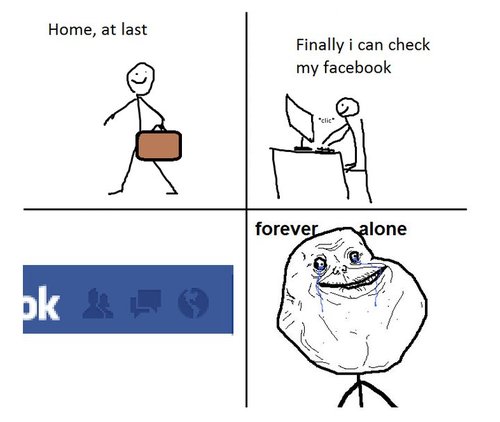 You spend forty-five minutes choosing the perfect link to share with all of your friends on Facebook, finally settling on a hilarious vide of a kitten peeping out from behind a window frame. You write a witty description and emphatic recommendation, and then realize it’s time to go to bed. You retire satisfied for the night, thinking how grateful your companions, family and coworkers will be for what you have done for them.
You spend forty-five minutes choosing the perfect link to share with all of your friends on Facebook, finally settling on a hilarious vide of a kitten peeping out from behind a window frame. You write a witty description and emphatic recommendation, and then realize it’s time to go to bed. You retire satisfied for the night, thinking how grateful your companions, family and coworkers will be for what you have done for them.
The next morning, you happily click on your Facebook page, ready to respond to your friends’ replies. Instead, you see this:

Your joy fading, you go to your email inbox to see if anyone has left any comments on your Livejournal site in which you post pieces of your artwork and lyrics from your favorite indie songs. Nothing. The inbox is empty. Not even any spam, or 3-year-old email forwards from your grandma warning about how sunscreen can kill children.
Crushed, you go back to Facebook, and scroll vacantly through your friend’s happy status updates and photos. Their lives continuing with no apparent concern for your own. Do they really care? You ask. Am I even really real?

Above: You.
Feeling alone in a crowd is not unfamiliar to anyone who has lived in a big city, or who has accidentally wandered into a romance novel convention. What makes it unique on the Internet is that the crowd is now comprised entirely of people who are meant to like you. It’s kind of like telling a joke that no one laughs at in the middle of a party thrown on your behalf, except at least then you can be reasonably sure that it was just an unfunny joke, and that they don’t secretly hate you. Why else would they be at your party?
But with the less ‘real’ friends of Facebook and other Internet social tools, and with less of the certainty that comes from actually seeing people’s faces and reactions, you are more likely to instead begin to obsess and rationalize. Was it just that no one was reading Facebook at that hour? Maybe some people did like it and appreciate it, but they just forgot to click ‘like’ or leave a comment? Maybe there was a technical problem and it didn’t come up on their feed, or –
Oh god, who are you kidding. They probably saw the link next to your name and thought “What’s this crap? Peeping kittens? God, I frickin’ hate that guy.” They are probably only keeping you on their list to make themselves feel better about not being quite as fat as you.
Realizing this, you crumble into black despair, until you are distracted by the next peeping kitten video.

It’s familiar to most of us: the creepily one-sided relationship where one person cares for or obsesses about the other, who is entirely unaware that he or she exists. Something like this has been around in mild form for a while: we’re pretty sure that far more people considered themselves married to Elvis than Elvis was actually married to. But the advent of the Internet has made this delusion mutate. But while in the past it applied mainly to celebrities (who presumably had the means of dealing with the problem by throwing money and naked women at it) it can now affect anyone silly enough to put their opinions online.
We’re not just talking about stalking here, or about young women thinking they are connected to the Jonas brothers on the astral plane. It can be far more subtle: you begin to read the blog of a certain witty writer, and soon, it’s on your daily links list. Whenever something controversial happens, you find yourself thinking “I wonder what Tom at PicturesOfBabyHedgehogs.org thinks about this turn of events!” and go to his site to check. Pretty soon, your brain, not wired to deal with the one-sidedness of Internet relationships, assumes that you’re old friends who have nightly chats.

He has other, better friends.
You know this guy’s family stories, his deepest opinions, his hedgehogs, the good and bad things about his life. He wouldn’t know you if you came up and kissed him (which you probably will one day). If it’s a popular blog, chances are he won’t have time to respond to your messages even if you do write to him. And attempting to ‘even out’ the relationship by telling him a bit about yourself out of the blue will come across as creepy oversharing.
It’s true that most of us will not ultimately react to this by going and shooting the guy and leaving a single red rose on his bed. But it will almost definitely lead to heartbreak, as on the inevitable day that his blog goes down and you realize that once again, you’re all alone.

“Sorry. I didn’t realize you were a woman when I told that joke.”
Social networking sites like Facebook, LinkedIn and Classmates are great for catching up with old friends. They’re also useful for networking, and for maintaining contact with acquaintances who you otherwise would have forgotten to call (it makes it far less awkward later when you don’t have to make up stories about not calling them back because you suddenly came down with cancer). Problem is, while letting you know their contact details, the Internet also shows you some things about your friends that you might not want to know.
Say you bump into the attractive friend of a friend, and strike up a conversation. You discover to your joy that your new pal is amenable to having coffee sometime. Rather than exchange phone numbers, they give you their full name so you can look them up on Facebook.
Excited, you start gazing at photos of him or her and imagining the gradual blossoming of your physical affection. Then your eyes stray over to the side of their profile, and you see this:

Okay, you say to yourself. ICP. You can deal with that when you’re married. Well, okay, maybe you’re not really interested in ever settling down with an Insane Clown Posse fan. But you can deal with it on dates at least, unless you’re in the car and they want to listen… no, you can’t. Okay, maybe you can fake some sort of music allergy. But can you really handle someone who thinks it is acceptable to use that many apostrophes in an inappropriate fart analogy? You could have gone without knowing this stuff about them until after you have slept together, or preferably, after you were both dead.
It’s not just romantic partners, either. How do you react when this comes up on your Facebook feed, with your uncle’s name next to it?

It’s not like you can disown an entire branch of your family over an internet conspiracy meme. But the next holiday you spend together is going to be hell awkward. Once you know these things about a person, you can’t unknow them. It was far better back in the days when our conspiracy theories and bad taste was kept behind closed doors, or preferably, not talked about at all, and you could go happily to your grave without knowing that your favorite computer teacher from highschool now likes to dress up as Pikachu on the weekends.
There is another pitfall of reuniting with people you used to know – except that this doesn’t apply so much to people you like as it does to people you hate. Or more accurately, hated. The girl who you asked out when you were twelve, who responded by telling everyone that you had pooped your pants in front of her. The guy who came up with that embarrassing nickname for you in eighth grade when he figured out that your last name rhymed with ‘butt’. The dude that deliberately ran you down with his car when you were eight – what was with that guy?
Really, the best way for most of us to maintain our fragile grip on sanity is to tell ourselves that everyone who wronged us in the past is now not only working the night shift at Denny’s, but also getting picked on by the night manager who deliberately breaks the toilet and makes them fix it. And before the rise of social networking, most of us could go for most of our lives believing it.
These days, though, no matter how far you leave your past behind, you only have to be friends, or friends of friends, with someone to know how exactly your past rival is going. Hell, even if you avoid social networking yourself, you might have a friend who doesn’t, who will absentmindedly let it slip to you that the girl who beat you out for that band scholarship is now a multi-millionaire who lunches with the President and owns your hometown.

Meanwhile, you live here.
Don’t get us wrong: in the past, you could still compare your own life and success with that of your neighbors. But you didn’t have so much at stake, because unless you live in a very small town, your neighbors probably weren’t the ones who beat you up in high school while screaming “Stop hitting yourself! Stop hitting yourself!”
All of these negative emotions might possibly contribute to…
Looking at successful people on the internet might get you angry, but it’s nothing compared with the blinding red mist that clouds your vision when you see online statements like this:

Now, in times past, when someone was totally, ass-stupidly wrong about something, you could punch them in the face (or if female, remove your gloves and give them a ladylike slap). Hell, you could at least stare at them angrily for a while. Now, with your stupidity target nowhere in your actual physical vicinity, there is nothing to do but argue. And argue some more.
Six hours later, when the sun is long set and when your argument partner simply signs off after calling you a ‘fag’ one last time, there is nothing you can do at all. Hell, these days it’s even illegal to thrash the nearest orphan.
The only outlet for your continued rage is contained within your computer. It calls you back when you try to leave, offering you the chance of further incoherent fury and the possibility of sweet relief. You toss and turn through the night, thinking only of returning to your keyboard and explaining to that moron why world poverty can’t be solved by everybody simply printing more money. Eventually you get fired from your job for constantly logging in to Yahoo!Answers and pounding your firsts wildly on the keyboard.

“THERE’S NO APOSTROPHE THERRRRRRRRRRRRRRE!”
But still, relief does not come, because even in the extremely rare occurrences when your partner concedes that yes, you are right that there is not a massive conspiracy by pharmaceutical companies to withhold a cure for cancer so that they can continue to make money on cancer treatments, there will always be someone else. You can never really sleep, not again, because you are no longer innocent of this knowledge. Until the day you die, you will never rest, because you know that someone somewhere on the internet still thinks that steel only melts at 1,874,000 degrees Fahrenheit, and that if you don’t reply to this chain letter about the headless doll by midnight tonight you will totally die.
